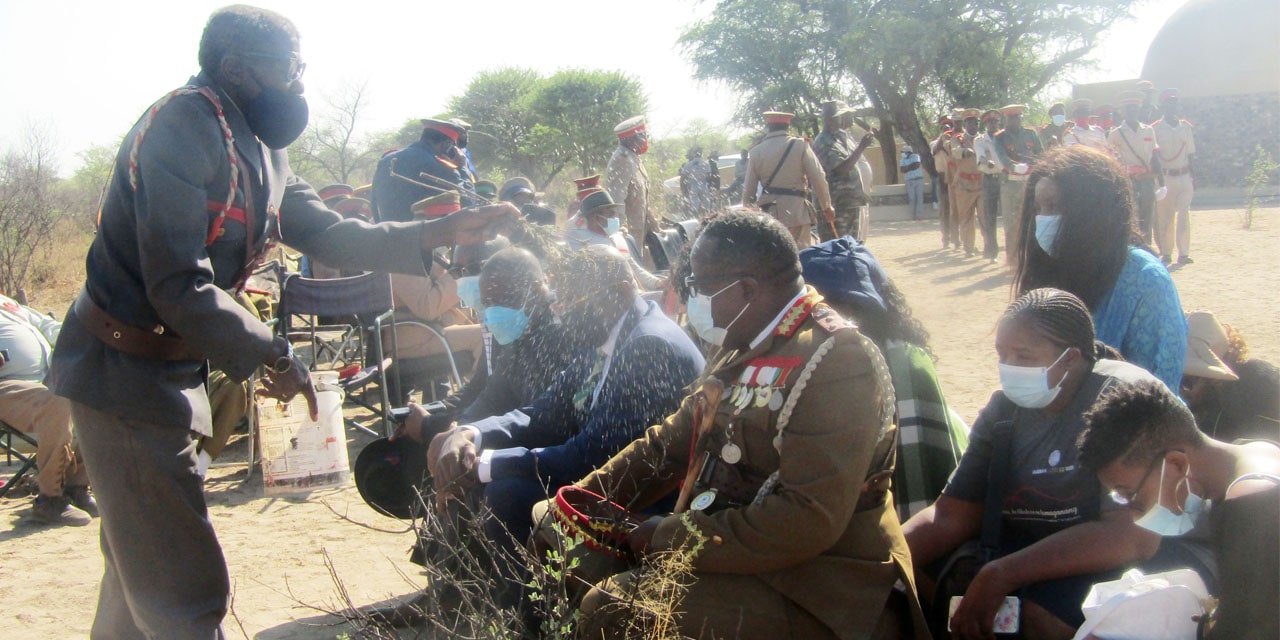Staff Writer
Those who attended this year’s 117th commemoration of the October 2, 1904 extermination order against the Ovaherero by then Imperial Germany’s army commander, Lothar von Trotha, in the then German South West Africa, as Namibia was previously known, saw a really somber and solemn occasion.
Ovaherero and Ovambanderu women, as it would behooves their culture on the occasion of also the tenth anniversary of the return of the first consignment of human remains, to typify the solemnity and somberness of the commemoration at Ozombuzovindimba in the Otjinene Constituency, where the order was issued, held a vigil in the sacred hut over skulls replicas, representing the actual skulls, which are housed in the Independence Memorial Museum in Windhoek. Adding to the somberness and solemnness of the occasion was the tombstone unveiling of one of Otjinene Red Flag Commando stalwarts, horse regiment leader, Usiel Kasoko Muundjua.
The commemoration followed the tenth anniversary commemoration of the return of the skulls at the Independence Memorial Museum last Thursday, presided over by former Minister of Basic Education, Katrina Hanse-Himarwa, a genocide descendant herself, as key note speaker. This is amidst the ongoing debate in the National Assembly (NA) regarding the Joint Declaration between the Namibian government and its German counterpart pertaining to Genocide, Apology and Reparations (GAR).
Various Ovaherero and Ovambanderu traditional leaders of also had an audience with Vice President (VP) Nangolo Mbumba last Wednesday, reiterating to him their concern about the Joint Declaration being steamrolled by the Swapo Party of Namibia majority in the august house against their best wishes as leaders of affected communities and the affected communities themselves.
“That our government facilitates a consensus building process among the affected communities with the intent for them to craft a common and unified position with all stakeholders being part of this process, from within Namibian and in the Diaspora,” pleaded the traditional leaders with the Vice President as a way forward with the Vice President assuring them that they have nothing to fear from the current debate in the NA.
Prior to the tabling of the motion on the Joint Declaration in the NA on 21 September by Defence and Veterans Affairs Minister, Frans Kapofi, the Vice President declined these leaders the requisite audience. Whereupon they sought the intervention of fellow traditional leaders in the North. Their fellows from the North met the Vice President and subsequently the Ovaherero and Ovambanderu traditional leaders met the Vice President on October 3.
Thus the Ozombuzovindimba 117th commemoration provided a platform for these traditional leaders to give the affected communities feedback regarding the meeting with the VP and his assurance that nothing against the best wishes of the traditional leaders and the affected would emerge from the NA regarding the Joint Declaration.
But this an assurance that the traditional leaders would like to see cast in iron and in concrete terms rather than just going by the word of mouth of the VP as the keynote speaker, Chief Turimuro Hoveka, made it categorically clear at the Ozombuzovindimba 117th commemoration on Saturday.
Hoveka highlighted that efforts at GAR are multifaceted and multipronged and various people are contributing to the same objective from their different vantage points, What matter is that the ultimate objective is one. With the advent of the Joint Declaration and before it was tabled in the NA Hoveka says they approached the VP but due to his busy schedule he was unable to meet them. Hence they sought the intervention of fellow traditional leaders from the North. This, Hoveka says is in line with the practice established with the centenary commemoration of Genocide in 2004 when Ovaherero Paramount Chief, late Kuaima Riruako invited late Aandonga King, Elifas Kauluma, to the centenary commemoration at Ohamakari in the Okakarara Constituency.
Their simple and straight appeal to the fellow traditional leaders was prevail upon Members of Parliament to debate and listen to the Joint Declaration but at the end of the day not take a decision going against the best wishes and interests of the affected communities. This message was conveyed and was followed up with a meeting with the VP. This, Hoveka says, but one of various attempts from their side and according to him was successful. By the VP’s assurance that the Joint Declaration must not be steamrolled through Parliament if the affected communities object to it. With the VP also assuring that those currently outside the negotiation process may join it. “We don’t know if this may have been political talk but we are waiting for one day to be called to the negotiation table,” Hoveka says.




